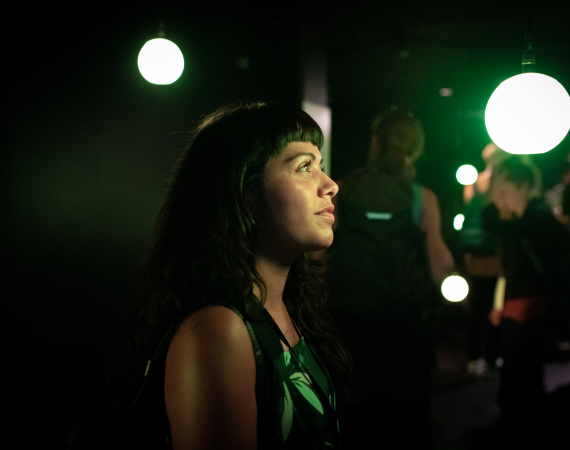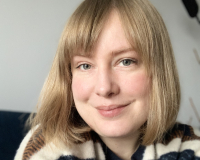Posted on Thu 27 Jan 2022
R&D you can see
In this article Danielle Rose, Network Producer at Watershed outlines our aims to create more accessible, fun ways for people to witness and participate in some of the Studio community’s research and development projects.

Credit: Jon Aitken
Posted by

Danielle Rose
Danielle is part of Watershed's team working on MyWorld. She manages the Springboard Fund & supports R&D through providing opportunities to test prototypes and get feedback on work-in-progress, whilst developing new networks.
As well as Watershed reaching the grand age of 40, this year Pervasive Media Studio turns 14. Since the Studio has existed, it’s been a place where new creative technology work has been created and shared, though the technology being tested has changed a fair bit since 2008! Over the next few years, we’re focusing our efforts on creating more accessible, and fun, ways for people to witness and participate in some of the Studio community’s research and development projects.
My name is Danielle Rose, and in October I joined the Watershed team as Network Producer. My role is a new role for the organisation. The creation of my role evolved out of a recognition that though so much exciting and ground-breaking work is coming out of Pervasive Media Studio, not nearly enough people know about it or how to get involved.
Watershed is also a partner on MyWorld, a UKRI Strength in Places funded project, aiming to build Bristol and Bath’s reputation as a world leader in screen-based media. Over the next few years, through MyWorld, creatives and research teams will be testing the limits of everything from Augmented Reality and Virtual Reality, to digital doubles and avatar creation. So, as well as all the work that comes out of the Pervasive Media Studio, we’ll also be offering opportunities to see some of the work of MyWorld partners in development too.
There are already ways you can hear more about some of the research and development work of the Studio community, including our Friday lunchtime talks and our First Friday monthly social events. Sometimes Residents also organise their own sharings, though one impact of COVID has been a reduction in in-person activity. Over the next few years, we’re looking forward to exploring and playing with new ways of sharing work-in-progress, with both the general public and targeted groups. This blog is one way we wanted to share some of our thinking with you. We look forward to hearing what you think.
Why bother sharing research & development?
Creative technology continues to develop and change rapidly. Whether people engage directly with new technologies or not, many of them are set to affect our lives and the planet we co-habit, in the short and long term. We think that people should have opportunities to learn more about the things that will or do affect them. Inviting people into the research and development stage of projects, is one way of sharing information and knowledge more widely.
The UK’s creative and cultural workforces do not reflect the diversity of the UK population. We think that if only a small unrepresentative segment of the population gets to contribute to the development of new media, products and technologies, that we’ll all be poorer for it, and that those furthest removed from the rooms where decisions are made will continue to be most negatively impacted. Including a wider range of perspectives, skills and lived experiences in the research and development phase of projects can lead to better end results.
We think that audiences and participants can get a sense of joy and excitement from interacting with pioneering work-in-progress whilst makers can simultaneously benefit from external feedback and new perspectives. In the long term we also hope that we can contribute to changing who considers working in the Creative Media and Tech sectors in the first place, by introducing more people to a wider range of opportunities and careers available.
How do we create the right conditions?
As hosts and facilitators, one thing we’ll be thinking a lot about is how to create the right conditions for everyone involved. This includes thinking about both the makers sharing their work-in-progress and the audiences / participants we’ll be inviting into the process. We’ll continue to learn and reflect as we go, but here are some things we’re thinking about already:
- Timing – we’ll be looking for the right moments within the R&D process to share work. This will include consideration of points where creative teams may feel most comfortable sharing their work, and when outside feedback is valuable.
- Vulnerability – for many people it can feel scary to share ideas or work that are not polished or fully-formed. We’ll be thinking about how to clearly communicate with everyone involved to help manage expectations and will also be considering how to facilitate the feedback process.
- Intellectual Property – some makers may have elements of their project that they don’t want to or are not permitted to reveal to too many people too early. We’ll be discussing this with teams on a case-by-case basis.
- Communication – not everyone is good at communicating what they do with people who don’t work in their sector or with similar technology to them. We’ll be thinking about how we support creatives and researchers to talk about their work in accessible language and will also consider where external facilitators could enable better exchanges.
- Digital literacy – participants and audiences may sometimes need support to understand the technology and equipment being used, before they can understand the project itself. We will not take for granted what people may know or not know, and will facilitate appropriate introductions.
As well as above, as an organisation Watershed strives to consider inclusion and access across all its programmes and activity. This area of work will be no different.
What happens next?
Existing Pervasive Media Studio Residents are invited to get in touch with me if you anticipate that you have R&D work happening over the next 12-18 months that you’d like to explore sharing with other people in some way.
‘Other people’ could be anyone from other Studio Residents to the general public or very specific targeted groups.
Knowing what you’ve got coming up and what your ambitions are, will help us make sure that the programmes we develop fit Residents’ needs better.
Here are some of the kinds of things we’ll be exploring:
- Regular show and test days in the Studio.
- Development of First Friday as a way of informally sharing work made by the Studio community in a social setting.
- Programme development of Friday lunchtime talks.
- Encouraging the return of resident-instigated testing, enabled through easy and transparent systems for DIY events (including knowing what spaces and equipment are bookable).
- Partnerships with the Watershed cinema teams around sharing immersive / screen-based work.
- Making use of the full Watershed building, including creation of test spaces in areas like the café-bar and Studio 5.
- Sharing work in other venues in Bristol and beyond.
It’s important that we make clear that we don’t just want to support brand new projects. We also want to support Residents who have older projects they want to remount, which may not have yet reached their full potential. Or, perhaps you have a project that stalled due to Covid, not finding the right partners, lack of funds, or the idea just being too ahead of its time! Do tell us about these projects too.
If you’re a member of the public reading this and are interested in opportunities to see work in development in future, please keep an eye out on https://www.watershed.co.uk/studio/ for announcements.